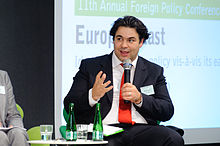- Mark Leonard (writer)
-
Mark Leonard (born in 1974) is a British foreign policy thinker and the author of the acclaimed books Why Europe Will Run the 21st Century a 'Foreign Affairs best-seller' which was published in 2005 and has been translated into 19 languages and What Does China Think? which was published in 2008 and has been translated into 14 languages.
Leonard is co-founder and director of the European Council on Foreign Relations, the first pan-European foreign policy think-tank which was launched in October 2007. It has offices in Berlin, London, Madrid, Paris, Rome, Sofia and Warsaw and a council chaired by Martti Ahtisaari, Joschka Fischer and Mabel van Oranje. Previously, he was director of foreign policy at the London-based Centre for European Reform, and director of The Foreign Policy Centre, a think-tank founded under the patronage of Tony Blair and the late British Foreign Secretary Robin Cook in 1998.
He has spent time in Washington as a Transatlantic fellow at the German Marshall Fund of the United States, and in Beijing as a visiting scholar at the Chinese Academy of Social Sciences. In the 1990s Leonard caused waves with the publication of Britain (TM), a report for the think tank Demos which is credited with launching "Cool Britannia". At the Foreign Policy Centre, Leonard wrote the influential report Public Diplomacy and served for many years on the UK government's 'Public Diplomacy Strategy Board'.
Leonard writes, broadcasts and speaks regularly on international affairs. His work has appeared in publications including The Financial Times, The International Herald Tribune, The Wall Street Journal, The Guardian, The Independent, The Daily Telegraph, Prospect, The Spectator, New Statesman, Foreign Policy, The Washington Quarterly, Country Life, Arena, Daily Mirror, Daily Express, and The Sun. He is a former member of the Young Fabians and co-founded its magazine Anticipations.[1]
Contents
Published works
His publications include:
- The Spectre of a Multipolar Europe, ECFR Security Report, by Mark Leonard and Ivan Krastev, with Jana Kobzova, Dimitar Bechev and Andrew Wilson, October 2010
- Re-wiring the US-EU relationship, ECFR memo, by Mark Leonard, Ulrike Guérot and Daniel Korski, 8 December 2008
- Can the EU win the peace in Georgia?, ECFR policy brief, by Mark Leonard, Andrew Wilson and Nicu Popescu, 25 August 2008
- A Power Audit of EU-Russia relations, ECFR report, by Mark Leonard and Nicu Popescu, 7 November 2007
- New World Order: The balance of soft power and the rise of herbivorous powers, ECFR policy brief, by Mark Leonard Ivan Krastev, 24 October 2007
- Divided World: The struggle for supremacy in 2020, Centre for European Reform, January 2007
- The EUs Awkward Neighbour: time for a new policy on Belarus, Centre for European Reform, April 2006
- Georgia and the EU: can Europes neighbourhood policy deliver?, Centre for European Reform, September 2005
- Crunch-time on Iran: Five ways out of a nuclear crisis, Centre for European Reform, July 2005
- Democracy and Human Development in the Broader Middle East: A Transatlantic Strategy for Partnership, Istanbul Papers, July 2004
- Re-ordering the World: The long-term implications of September 11th, Foreign Policy Centre 2002
- The Pro-European Reader (edited with Dick Leonard, Palgrave-Macmillan, 2002
- Public Diplomacy, Foreign Policy Centre,2002
- Network Europe, Foreign Policy Centre, 1999
- Britain (TM), Demos, 1997
- Politics without Frontiers, Demos 1997
Public Diplomacy
Mark Leonard was accused of spreading propaganda by Mark Curtis in his book Unpeople (published in 2004). In the book, Curtis describes Leonard "one of the most passionate intellectual articulators of this new form of propaganda [public diplomacy]." Curtis also accuses Leonard of not acting or believing in the public's interests. Leonard is quoted to have said that, "the rise of global NGOs and protest movements" are a threat which "have changed the nature of power and put even greater constraints on the freedom of action of national governments." The most influential protest movements in living memory are the Civil Rights Movements during the sixties. These were grass roots movements that changed public opinion of African Americans from being below white people, to being equal to them. The movement officially started in 1955. The US government created a Civil Rights Act in 1964, banning discrimination based on "race, color, religion, or national origin". The government did not have 'freedom of action'. Instead it was forced to act in the public's interest. [2] [3]
See also
References
External links
- Mark Leonard's website
- European Council on Foreign Relations' website
- Times Online review of "Why Europe Will Run the 21st Century"
- Critical review of Leonard's book from Times Literary Supplement
- Mark Leonard's articles for Prospect Magazine
- What Does China Think? - Amazon

This article about a non-fiction writer from the United Kingdom or one of its constituent countries is a stub. You can help Wikipedia by expanding it.

